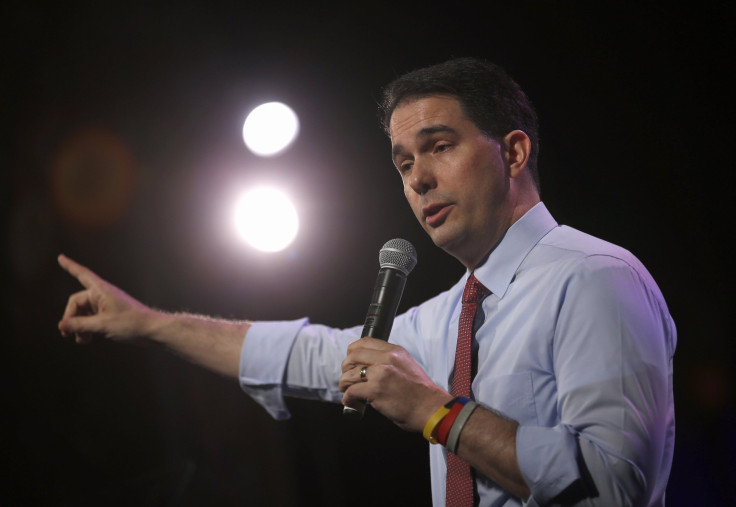Scott Walker Proposes Drug Testing For Benefits Seekers, Cutting Public University Funding

Wisconsin Gov. Scott Walker delivered his new budget Tuesday, which includes provisions for drastically cutting public university funding, requiring drug tests for those seeking public benefits, and expanding a private school voucher system, The Associated Press reported.
Walker argued that his budget, which would also deliver on one of his campaign promises to continue lowering property taxes, would help people achieve financial independence.
"Our plan is based on growth and opportunity, which leads to freedom and prosperity for all," he said. "Secondly, our plan will use common sense reforms to create a government that is limited in scope and, ultimately, more effective, more efficient, and more accountable to the public."
The budget is the last that he will introduce before the 2016 presidential campaign, in which he is widely expected to run. Republicans control the Wisconsin legislature, but several state Republicans have voiced opposition to the proposed $300 million cut to the University of Wisconsin system, as well as a plan to borrow $1.3 billion to pay for roads and infrastructure renewal.
Joe Parisi, an executive of Dane County and a Democrat, has threatened legal action over Walker’s plan to test those seeking unemployment benefits for drugs, ABC affiliate WQOW reported.
“People who fall on hard times should not be treated like criminals; they should be treated with dignity and respect,” Parisi said, at a Monday news conference at the Dane County Job Center. “Requiring someone who has just been laid off from their job to pee in a cup is not treating people in a dignified manner; it is degrading and insulting.”
According to the National Conference of State Legislatures, 12 states -- Alabama, Arizona, Florida, Georgia, Kansas, Michigan, Mississippi, Missouri, North Carolina, Oklahoma, Tennessee and Utah -- have passed laws requiring drug-testing and screening for those seeking public assistance.
Walker gained national attention when he proposed his first budget in 2011, which effectively ended collective bargaining for workers in the state and increased health care and pension costs, as part of an effort to curtail a $3 billion deficit.
The Democratic Party criticized Walker’s latest budget proposal.
"Instead of taking 'bold steps' to find a solution to his state's budget crisis, Gov. Walker would rather play political games, further polarize his state, and exacerbate an already dire budget situation," Democratic National Committee spokesman Jason Pitt said in a statement, the AP reported.
© Copyright IBTimes 2025. All rights reserved.





















